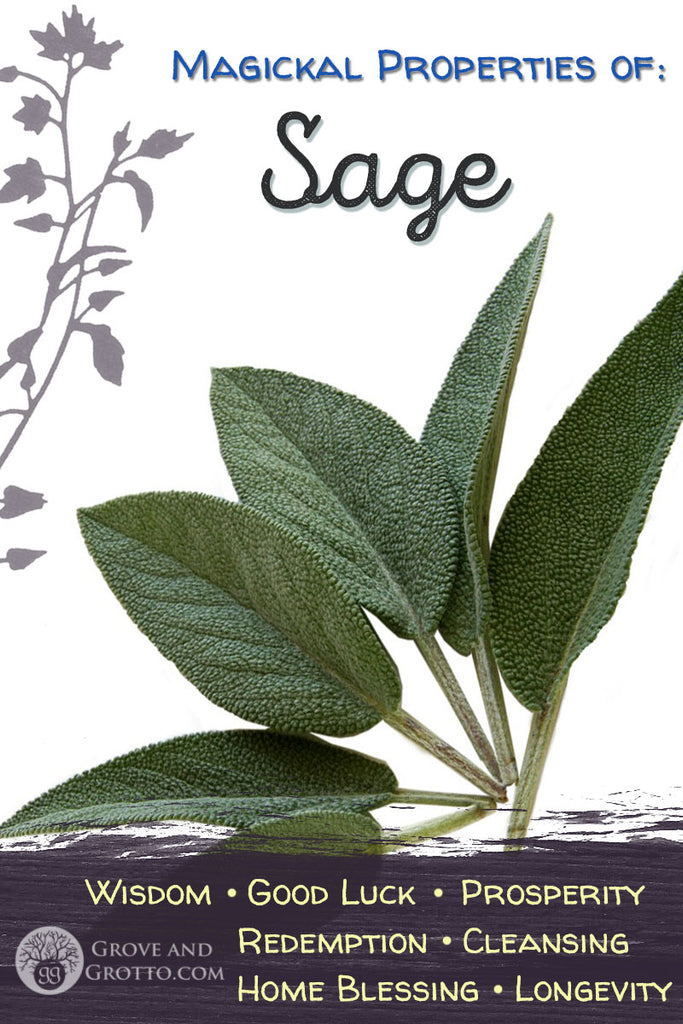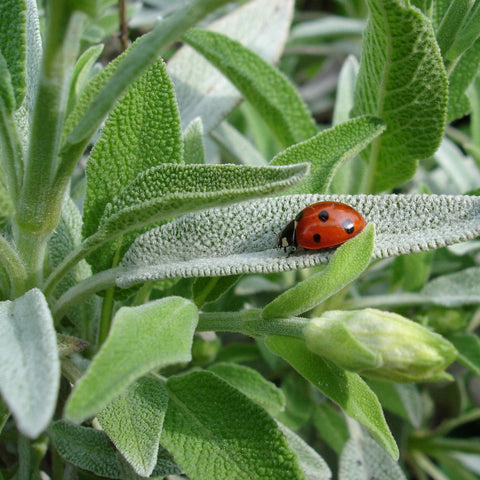
Sage is a popular garden herb with a sweet and savory aroma. Sage grows well in most temperate climates. Its velvety leaves release their fragrance when rubbed.
Sage was used medicinally in Egyptian, Roman, and Greek medicine. It is now best-known as a culinary herb for the dishes of Autumn, from roast turkey to sausage stuffing to pumpkin soup. An Old World herb, Sage was brought to the Americas by colonists for use in their gardens and kitchens.
This article refers to Common Sage or Garden Sage, Salvia officinalis. It is distinct from the White Sage (Salvia apiana) commonly used for smudging. However, both plants have a solid magickal pedigree, and many of their correspondences are similar. For a detailed comparison of smudging herbs, see our article "Sage advice".
Magickal Uses of Sage
In Roman times, Sage was sacred to Jove and was gathered with great ceremony. The genus name Salvia is related to the Latin word salvere, meaning to heal, preserve or redeem. Sage was associated in European traditions with wisdom, long life, and even immortality. An Italian proverb states, “Why should a man die when he has Sage in his garden?”
Sage is used to promote wisdom and bring in good luck. It builds emotional strength and may help to heal grief. Magickally, Sage is associated with protection and the granting of wishes. It appears in countless spells of kitchen witchery, especially those stemming from European traditions.
Sage is available in both fresh and dried forms. If you wish to try to grow your own, take heart: Sage prospers in most home gardens (even in pots). However, it is said to be unlucky to plant it for yourself. Get a seedling from a friend or have someone else do the job. Sage is said to love company—it is similarly unlucky to plant the herb in a pot or flowerbed by itself.
Sage leaves and bundles retain their shape well when dried and make an attractive addition to sachets and potpourri bowls. When crushed, the dried herb is added to purification incenses. Sage essential oil is readily available. Because Sage naturally repels pests and thrives without much intervention, organic Sage products are neither rare nor expensive.

Correspondences of Sage
Sage’s reputation for wisdom, protection, and good luck cast it squarely into the bounds of Jupiter. Like that most paternal of planets, Sage’s energy brings prosperity and guards over the home. The leaves even contain trace amounts of tin—a Jupiter metal.
However, it should be noted that some writers (including Christopher Penczak) list it with Moon herbs. Sage often has a white or blue-gray cast and is associated with the wisdom of the Crone.
The usual elemental tag for this fresh-smelling herb is Air. However, given Sage’s loyalty to hearth and home and links to manifestation magick, an alternative correspondence could be Earth.
Spells and Formulas with Sage
Write a wish on Sage leaf and burn it to release your intention. Alternatively, place the leaf under your pillow at night to dream of how your goal will be achieved.
Carry a Sage leaf in your wallet to attract money.
Burn Sage incense when seeking knowledge or guidance on a difficult decision.
Add Sage oil, incense, or herbs to any spell to temper the results with wisdom.
People who prefer not to use White Sage, either because of allergies or cultural sensitivity, may use Common Sage instead.
If you eat Sage leaves every day in May, you will be granted immortality. (Hint: Not really.)
Precautions
Sage is recognized as safe to use as a cooking ingredient. However, Sage contains the chemical compound thujone, which affects the nervous system. Ritual or medicinal use of Sage may intensify the sedative effects of some medications. Avoid during pregnancy.
Excessive or extended consumption of the essential oil or leaves can be toxic. Do not take Sage oil internally, and limit consumption of Sage tea to a reasonable quantity.
Scent Profile: Woody, Herbaceous, Sweet (sometimes Fruity, Nutty, or Lemony)
Correspondences: Jupiter, Air/Earth
Occult properties of herbs are provided for historical interest only, and no outcome is guaranteed. Nothing on this website should be taken as medical or legal advice. Please use herbs responsibly.
